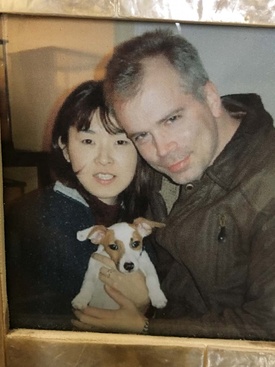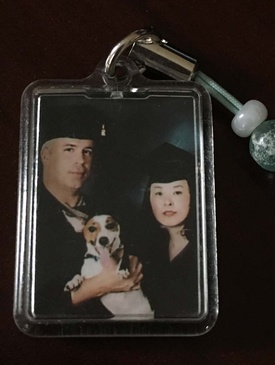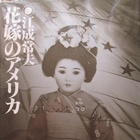A chance encounter at Yokota Air Base
Junko, who was born and raised in Hachioji, Tokyo, recalls, "Even when I was in kindergarten, I would cry loudly, and my teachers would say, 'You're a child who speaks your mind.'" She vaguely dreamed of becoming an anime voice actor or a police dog trainer in the future. Wanting to get out into society as soon as possible, Junko dropped out of high school and started working at Yokota Air Base in the Tokyo metropolitan area. "Not only was my father a driver in the vehicle department at the US military base when he was young, but my maternal grandfather also worked as a civil engineer at the base until he retired. My father later changed jobs, but he used to take me to festivals at Yokota Air Base when I was little."
Junko herself started working as a childcare assistant and babysitter at the childcare center on base, and was promoted to project manager for the communications company. Then, at one meeting, she had a fateful encounter. "My future husband showed up as a representative for the military staff who always came to the meetings. He worked in administration within the military."
Junko was 28 years old at the time. She married James, who was five years older than her, at the age of 30 after working with him when he "coincidentally showed up as a substitute at a meeting." There was no opposition from her family, and her father, mother, and younger brother all accepted the earnest James. Junko's father, who had always had a progressive attitude, had been telling her since she was a child to "look overseas."
So what was it about James that attracted Junko to the point that she decided to marry him?
"He has a warm, gentle personality. I quite like competitions like billiards, bowling and paintball, and I enjoyed doing those things with James when we went on dates. Some men get upset if they lose to a woman. But he remained calm whether he won or lost, and conversely, he supported me. Seeing him like that, I began to think that he was the kind of person I would marry. Also, after playing paintball, I thought his shoulders were broad, which was a deciding factor (laughs)."
Since being posted to Japan, James has studied kendo and naginata under a Japanese instructor, and has a third-degree black belt in both. "Even when we went to memorial services, the kendo practitioner remained calm even when sitting in seiza, which impressed everyone."
"I want to support you as you do your best"
After getting married, James was first posted outside of Japan to Germany, where he spent four years at the U.S. Army's European headquarters in Heidelberg, before being transferred to Beale Air Force Base in Northern California, where he retired from the U.S. military after 25 years of service in 2010. "He majored in history at university, and later, with the encouragement of the base's historian, he was able to publish a book on the history of Beale Base during the Cold War. Even now, he continues to work hard every day, collecting various materials little by little."
Currently, Junko works as a therapist and program supervisor at a psychological counseling office. "When I was in Germany, James encouraged me by saying, 'You should go to college. You'll be going to the mainland eventually, so you'd better study.' I like studying, but I didn't have time to explore Europe, so I started college at the same time as him the same month I arrived. I also attended night school when I was at Yokota, but I was working and didn't have enough money for tuition, so I didn't finish. In the end, with his support, I got a degree in psychology from the University of Maryland, which is located on the base in Germany." After that, she graduated from graduate school in California, which led to her current job.
Junko does not hide her gratitude to her husband for encouraging her to gain a skill. "For various reasons, it is not uncommon for wives of military men to be told by their spouses that they do not need to get a driver's license, and that they should wait to go to school or find a job. But James always told them to get out and to interact with (other) Japanese people, local people, and fellow US military personnel. He encouraged me and supported me in many ways."
Her husband continues to support her to this day. "I work surrounded by Americans, so it's pretty tough. Unlike in Los Angeles or Hawaii, there's not much demand for bilingual Japanese-English speakers in this area. I try my best, but there are many struggles every day. But when I get home, which takes an hour and a half each way, my husband has cooked Japanese food and is waiting for me. In the past, even if he made curry for me, I was very stubborn and would bluntly say, 'That's terrible! I can't eat this watery curry!' (laughs). For a while, he got annoyed and stopped making it, but he likes curry himself, so it's come back, and now the curry he makes tastes better and I can't complain anymore. I'm really grateful for his quiet kindness."
Apparently, James tells Junko, "You try too hard. You try too hard, so I have to support you." However, Junko, who is a very competitive person, says, "I'll be fine even if you don't support me," but it is clear that they share a strong bond.
Becoming tougher in the US military community
The night before the day they met 19 years ago, Junko was overcome by a strange feeling. She had an inexplicable premonition that "the next day, I would somehow meet the man of my destiny." "Then, when I woke up in the morning, he showed up at the meeting in my place, even though he wasn't supposed to be there. James also told me that someone who always attended told him, 'There's this scary woman called Junko. She's strict and she'll never say yes to a project,' so he was on guard for the meeting (laughs). So, rather than getting excited right away, we were both wary of each other."
Junko believes that being part of the American military and coming to America has made her mentally tougher. However, just as she had a father who advised her to "look outside" when she was young, she now has a husband who encourages her and cooks her delicious curry despite complaints.
Finally, I asked her what she thought she would have done if she hadn't gotten married and come to America. Junko answered humorously, "I think I would have been curled up in a warm kotatsu in Japan."
© 2018 Fukuda Keiko








